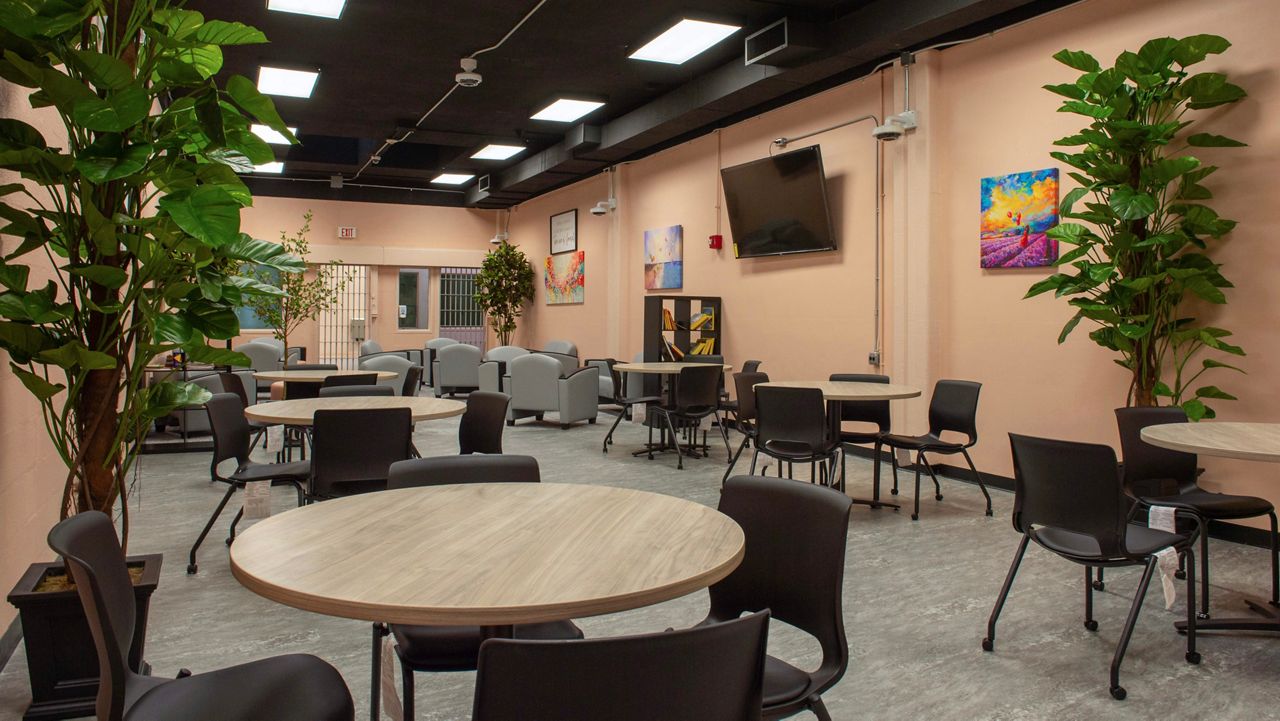WEST BOYLSTON, Mass. - When Marcel Santos-Padgett first came to the Worcester County Jail & House of Corrections in April, he was addicted to marijuana and alcohol. Realizing that he wanted to change his ways for both himself and for his family, Santos-Padgett voluntarily signed up for the jail’s 12-week Substance Treatment Opportunity Program, known as STOP.
“Before I got here, I was already planning on using as soon as I got out, ‘I’m just gonna smoke again, I can’t wait to get a drink again,’” Santos-Padgett said. “But now it’s like my mindset has changed. I don’t want to use, it’s not even an option for me anymore.”
The STOP program incorporates parenting classes by Pernet Family Health Services a nonprofit home health agency based in Worcester, as part of an approach to treating the underlying factors of addiction. Santos-Padgett has three daughters: 10, 9 and 3 years old. He said the parenting classes taught him that being a good father is about creating memories and spending quality time with his children.
“I need to rekindle the relationship that I had with my kids,” Santos-Padgett said. “Using drugs, I feel like it took a little bit of time away from them. I feel like I could have been giving them more time. And I just want to rededicate my time and energy to them because they deserve it.”
Santos-Padgett, 30, of Leicester, was arrested in March on a felony charge of possessing firearms without a license, Worcester District Court records show. He was sentenced to two years, but is serving six months in jail, with the rest of the time to be served on probation, records show.
The Worcester County Jail has created a new visitation space where participants in the STOP program can see their family members and children. The renovated area is designed to foster a sense of warmth and welcoming. The goal is to connect inmates with their families while further incentivizing their participation in STOP.
Traditionally, visits at the jail are conducted through a glass with two phones for communication, but the new space is carefully designed with mental health at the forefront. It features calming colors and furniture to resemble a living room, making it less intimidating for inmates’ children to visit. Being able to touch and communicate with loved ones is an impactful motivator for inmates.
According to Santos-Padgett, his youngest daughter doesn’t understand that he is in jail, and she thinks he is in school. During her first visit in the new visitation space, she excitedly ran up and hugged her dad, then calmly worked on coloring books in the room.
Worcester County Sheriff Lew Evangelidis said around 80% of the inmates in the county jail have substance misuse issues. The family visitation area is just the latest in a series of investments made to target the co-occurring disorders of substance abuse and mental health that typically underline criminal behavior. In June 2021, the jail added a $25 million facility at the prison campus, allowing for better health capabilities and mental health assessments while doubling the jail’s mental health staff.
Allowing visitors to have physical contact with inmates during visits is a very rare occurrence, which is why it’s only for inmates in the STOP program. Through strengthening the inmates’ support system, the goal is to reduce recidivism and break the cycle of criminal behavior that exists in some families, since individuals who had a parent incarcerated are 300% more likely to be incarnated themselves.
“We don’t coddle people here. We offer you opportunities to turn your life around, but you have to meet us halfway,” Evangelidis said. “So, we created an environment that is family-friendly and the whole goal is just to make them better parents and to make their children acclimated to their father’s release. At the end of the day, we want to just keep that family unit as strong as possible, so it’ll be less likely that the next generation will be following the prior generation.”
However, Evangelidis said access to programming alone will not change an inmate’s behavior. They also have to take responsibility for the actions which landed them in jail.
“A lot of people come in here, and they basically look upon themselves as the victim and they don’t realize that they victimized a lot of other people along the way,” Evangelidis said. “And that’s a really important part of their recovery process.”
The STOP program and the shorter-term Short STOP program run all year long, with the next cohort of 12 inmates starting their classes soon. Through incentives like use of the new visitation center, Abigail Rotti, the jail’s director of substance abuse, hopes that other inmates will take advantage of the program.
“A lot of the times this will be an inmate’s first time in a treatment program,” Rotti said. “So, they’re not really familiar with how addiction can impact really the whole family, not just the family, but people in the community as well. Learning about that ripple effect is a very big focus that we have.”
With only a week left in his sentence, Santos-Padgett is focused on his future and wants to do everything in his power to avoid seeing the inside of a jail ever again.
“Sometimes we think that we’re not hurting our families by using, but sometimes we are hurting those who are closest to us who really love us,” Santos-Padgett said. “They don’t want to see us go down that path.”



